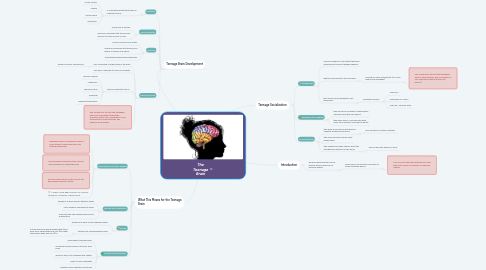
1. Teenage Brain Development
1.1. Dopamine
1.1.1. Is a neurotransmitter that plays an important role in....
1.1.1.1. motor control
1.1.1.2. reward
1.1.1.3. reinforcment
1.1.1.4. motivation
1.2. Neurotransmitter
1.2.1. found only in animals
1.2.2. chemical messenger that travels from neurons to other neurons or cells
1.3. Hormone
1.3.1. found in animals AND plants
1.3.2. chemical messenger that travels from glands to tissues and organs
1.3.3. transmitted through the bloodstream
1.4. Prefrontal Cortex
1.4.1. very connected to other areas of the brain
1.4.1.1. thicker and more connections
1.4.2. last area of the brain to reach full maturity
1.4.3. plays an important role in...
1.4.3.1. decision making
1.4.3.2. judgement
1.4.3.3. impulse control
1.4.3.4. reasoning
1.4.3.5. planning/organization
1.4.4. This connects to the fact that teenagers take more risks without taking the long-term effect into consideration; once the prefrontal cortex develops, this behavior will decrease
2. What This Means for the Teenage Brain
2.1. Risky Behavior and Thrill Seeking
2.1.1. heightened levels of dopamine make us more willing to seek pleasurable and thrilling experiences
2.1.2. less developed prefrontal cortex leads to more emphasis on reward then risk
2.1.3. difficulty with impulse control due to less developed prefrontal conrtex
2.1.4. = TEENS HAVE BEEN FOUND TO SHOW A TENDENCY FOR RISKY BEHAVIOUR
2.2. Planning and Organization
2.2.1. tendency to have shorter attention spans
2.2.2. more forgetful compared to adults
2.2.3. difficulty with task shifting and prone to preservation
2.3. Anxiety
2.3.1. tendency to dwell on the negative events
2.3.2. tendency to overemphasize losses
2.3.2.1. a study was done which showed that teens were more upset when they lost $20 rather than happy when they won $20
2.4. Positive Aspects include...
2.4.1. visual peak in teenage years
2.4.2. incidental memory peaks in the early teen years
2.4.3. ability to learn is at its highest and fastest
2.4.4. easier to learn languages
2.4.5. creativity and imagination are strong
3. Teenage Socialization
3.1. Disagreement
3.1.1. scholars disagree on the extent that brain development predicts teenage behavior
3.1.2. digital communication also increases
3.1.2.1. increase in online interactions (ex: social media, text messages)
3.1.2.1.1. This connects to the fact that teenagers want to stick together, and socialization is very important to them (online or in person)
3.1.3. they are also more engaged in self exploration
3.1.3.1. Questions include...
3.1.3.1.1. Who am I?
3.1.3.1.2. What skills do I have?
3.1.3.1.3. Who will I socialize with?
3.2. Teenagers Stick Together
3.2.1. they prefer the company of people their own age more than ever before
3.2.2. they have more in common with each other; very different compared to adults
3.3. Social Evaluation
3.3.1. they have an increase in positive and negative emotional responses
3.3.1.1. very sensitive to certain situations
3.3.2. they care more about what other people think
3.3.3. they always have speculations about the thoughts and feelings of their peers
3.3.3.1. this is called the "theory of mind"
4. Introduction
4.1. the brain goes through 'critical periods' which influence our decision making
4.1.1. some neuron connections are easier to make during this period
4.1.1.1. This connects with the development of the prefrontal cortex it influences our decision making
